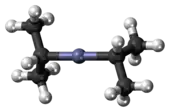 | |
 | |
| Identifiers | |
|---|---|
3D model (JSmol) |
|
| ChemSpider | |
| ECHA InfoCard | 100.221.415 |
PubChem CID |
|
CompTox Dashboard (EPA) |
|
| |
| |
| Properties | |
| C6H14Zn | |
| Molar mass | 151.56 g/mol |
Except where otherwise noted, data are given for materials in their standard state (at 25 °C [77 °F], 100 kPa).
Infobox references | |
Diisopropylzinc is an organozinc compound with the chemical formula ZnC6H14.[1]
It is the key reagent in the Soai reaction, which is both autocatalytic and enantiospecific.[2] This chemical is pyrophoric, bursting into flame in air or in contact with water. It is generally packaged in toluene. [3]
References
- ↑ Benjamin Bederson; Herbert Walther (2002). Advances in Atomic, Molecular, and Optical Physics. Gulf Professional Publishing. pp. 250–. ISBN 978-0-12-003848-0. Retrieved 2013-08-06.
- ↑ Shibata, Takanori; Morioka, Hiroshi; Hayase, Tadakatsu; Choji, Kaori; Soai, Kenso (1996). "Highly Enantioselective Catalytic Asymmetric Automultiplication of Chiral Pyrimidyl Alcohol". Journal of the American Chemical Society. 118 (2): 471–472. doi:10.1021/ja953066g.
- ↑ "Diisopropylzinc 1.0M toluene 625-81-0". MilliporeSigma. Retrieved 8 January 2022.
This article is issued from Wikipedia. The text is licensed under Creative Commons - Attribution - Sharealike. Additional terms may apply for the media files.